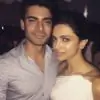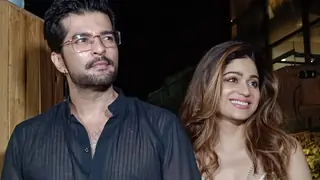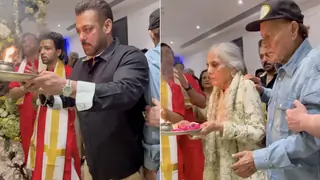Khoobsurat lead Fawad Afzal Khan does not have to make an effort to score as a hero in India, for the Pakistani actor already has a rising fan graph post the telecast of his serial, Zindagi Gulzar Hai. Which is why his entry into Bollywood as Vikram Rathore in Khoobsurat opposite Sonam Kapoor created ripples much ahead of the release of the film. No wonder Sonam described the actor as "talented, sexy, well-mannered, good-looking with a great taste in music" recently.
Khoobsurat is a love story between a happy-go-lucky girl Dr Milli Chakravarty and a Rajasthani prince with the old world charm, Vikram Rathore. "My character is that of an ambitious person who has a no-nonsense attitude and is definitely not the young-at-heart types. Even then post the launch of Khoobsurat trailer, the response was great and I hear the release has also been well appreciated by audience," says Fawad, who explains working in India with the likes of Anil Kapoor and Sonam as something "extremely warm and pleasant". "The Kapoors and everyone attached to the film made me feel at home, which I'll remember forever. Sonam is wonderful team player and an even better host."
Explaining about the role he is playing, the actor says each character has its own importance and there is no point tagging a film male or female-oriented. "Khoobsurat is a Disney fairytale. It's a girl meets the royal family and her prince charming kind of a story. I really can't comment on how much people would want to dissect characters in a Disney romantic comedy"
Fawad says he has not followed Indian cinema very closely though he has watched a number of Hindi films. "It is different but exciting to work outside Pakistan. I expected the whole process to be a learning experience. Something that always lends to the growth of an artist to be able to work in unfamiliar territory. This for me is the first step."
The actor, expressing his thankfulness to the Indian audience for appreciating him and his work in Zindagi Gulzar Hai, says, "It's an honour for me to have a following with such a limited body of work to show off. I'm flattered,'' says Fawad, who feels drawing a comparison between India and Pakistan in terms of work ethos and audience reaction is not proper. "After this experience in India, when I work in cinema back home, I'll be in a better position to compare and hopefully contribute in areas where I feel there are shortcomings, if there are any. But I am sure, the expression of the audience here is just as warm and heartfelt as it is in Pakistan, he says.
On facing any resistance in Pakistan for Bollywood aspirations, the actor is quick to clear the air, saying he does not believe in what he hears unless he experiences it firsthand. 'You won't be able to keep everyone happy at any point in time. I'd like Indian actors to participate in the Pakistani industry as well. This exchange of actors should not be frowned upon when it's happening all over the world. It is one of the many initiatives that may bridge the gap and educate those who do not know about either sides more than just a newsflash."
Influenced by world music, industrial, progressive metal and alternative, Fawad had been involved in many music projects through his band Entity Paradigm, which he quit owing to work pressure. He's now been writing music, producing and recording in his home studio and has also done a lot of jingles for TV campaigns. 'Entity Paradigm is pretty much still active. But I'm not a part of it anymore. With an active acting career, it was getting tougher for me to keep up with both.''
On working in Indian television, the 33-year-old says he is open about the idea. 'For now, I'm trying my luck at cinema. After that I feel I can bring something new back to TV. The marriage between film and television can bring about a revolution in television programming in our region of the world. It's working everywhere else.''
As far as working with other banners in India is concerned, Fawad does not want to reveal anything till something concretises. "For now I am thankful to all my fans. Art is nothing without an admirer and an artist is half him/herself and half the audience. Without the latter half, the former ceases to exist," he signs off.






































